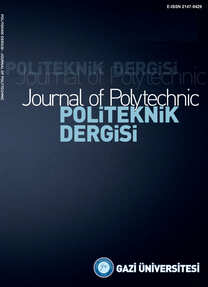ÜSTEL OLARAK AĞIRLIKLANDIRILMIŞ TOPARLAMA DİZİLERİ KULLANAN BİR DD-KBÇE SİSTEMİ İÇİN DOĞRU VE BASİT BİR KOD SEÇME KRİTERİ
Kod seçimi, bir doğrudan dizili-kod bölmeli çoklu erişim (DD-KBÇE) sisteminin başarımı üzerinde oldukça etkilidir. Çoklu erişim sistem tasarımcılarının amaçlarından birisi, mümkün olduğunca düşük çoklu erişim girişimi ile bir frekans bandının olabildiğince fazla sayıda kullanıcı tarafından kullanılabilmesini sağlayacak yayma kodlarının bir grubunu ortaya koymaktır. Eğer, üstel olarak ağırlıklandırılmış toparlama dizilerinin kullanıldığı bir DD-KBÇE sistemindeki aktif kullanıcıların sayısı, verilen bir kod setindeki kod sayısından daha az ise, alınan bilginin kalitesi açısından en iyi bit hata oranı başarımını sağlayacak kodların belirlenmesi oldukça önemlidir. Bu çalışmada, üstel olarak ağırlıklandırılmış toparlama dizileri kullanan bir DD-KBÇE sistemi için verilen bir kod seti içerisinde diğerlerine göre daha iyi bit hata oranı başarımları oluşturacak referans yayma kodlarını belirleyen basit ve doğru bir kriter önerilmektedir.
AN ACCURATE AND SIMPLE CODE SELECTION CRITERION FOR A DS-CDMA SYSTEM
WHICH EMPLOYS EXPONENTIALLY WEIGHTED DESPREADING SEQUENCES
Code selection has a large impact on the performance of a direct sequence-code division multiple access (DS-CDMA) system. A goal of spread spectrum system designers for a multiple access system is to find a set of such spreading codes that as many users as possible can use a band of frequencies with as little multiple access interference (MAI) as possible. If the number of active users in a DS-CDMA system using exponentially weighted despreading sequences is less than the number of codes in a given code set, it is very important in terms of the quality of the recovered information to determine the codes which will yield the best bit error rate (BER) performances. In this study, it is proposed that, a simple and efficient criterion which enables the determination of the spreading sequences in a given code set achieves better BER performances than others when used as references for a DS-CDMA system which employs exponentially weighted despreading sequences
